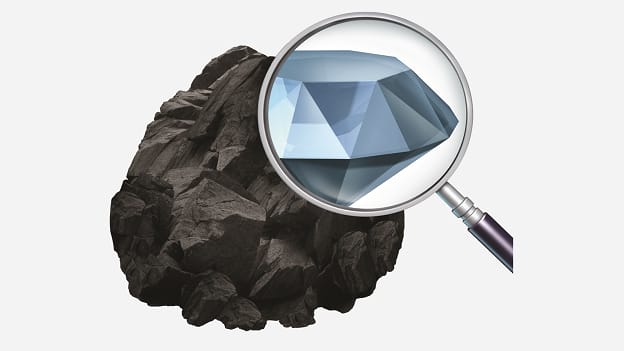The myth of a perfect employee

While Gemology, a science dedicated to the study of precious stones, is a vast field of enquiry into geology, the aspect of it which deals with colors is of particular intrigue – and with significant lessons for us in the field of leadership and employee fitment.
An elementary study of precious stones tell us that there are precious stones like diamonds, rubies, sapphires and emeralds, while all other gemstones are semi-precious. Sapphire and Ruby, two of the most popular gems are actually cousins — both are corundums i.e. made up of aluminum oxide, but differ in the nature of impurities that are embedded in them. The impurity chromium gives Ruby a red hue, while an impurity of Iron or Titanium gives Sapphire a blue, green or pink of purple color.
Beryl, chemically known as beryllium aluminum cyclosilicate, is a large joint family. The same culprit chromium gives it a green color here and is called an emerald; while the impurity of iron gives it a golden color. The list is endless and the gem lovers have these impurities to thank, for what would have been the appeal of a ruby or a sapphire or an emerald without its color!
An impurity or an imperfection so to speak is the reason for the value of a stone. Take away its imperfection and it’s just a stone.
But humans treat imperfections in a very different way. It’s something to be detested, hated, criticized, corrected, feed backed, harped endlessly to the point of being nagging and frustrating, brought up needlessly and tactlessly at most inopportune times. It usually passes our attention that what appears as an imperfection may be only something that we do not like, something that only we are not comfortable accepting, or something that is unacceptable to our sensibilities and not something that may be fundamentally or universally unlikable or wrong or bad. Our own sensibilities cannot and must not decide what an imperfection in a human being is arguably.
Aggression, forthrightness, ambition, result orientation, candor, courage so on and so forth can be virtues with double edges. One man’s food can be another man’s poison, and what can be one person’s strength will be classified as another’s area of development! Who knows for better or for worse, how a person might look once you take away what to some appears as an imperfection. Take away the impurity of chromium and a ruby is just another stone.
It would be wise, before we judge in people what would be an impurity to our eyes, for if he were to get rid of it, he might also rid himself of his greatest strength, the one thing that might be his greatest ally in the pursuit of an outcome. Not all imperfections need to be eradicated in human beings — mostly it’s not possible, sometimes it’s not desired. Nature perhaps teaches us a thing or two about tolerance to imperfections. Only in the human world, the notion of purity or perfection is so vehemently defended and even propagated – assuming that it is even possible in the first place. Let’s look at this through the lens of an example, even though it might be an extreme and controversial one. The doggedness in a founder to make an otherwise untested concept into a profitable scalable business also makes him/her ignore its effects on culture and ethos, as the recent Uber saga tells us. Unfortunately it’s the same doggedness that has been responsible for both – the meteoric rise of Uber as well as its cultural fault lines. Who knows if Uber would ever have become what it has, had Travis Kalanick not been what he was, with all his imperfections, failings and strength. Just a clarification needed to put the argument in context — this is not to defend personality imperfections or justify toxic behaviors, or the fundamental premise if human beings could become better than what they are; this is only to point out that on an average human beings come as a package of what they are brilliant at and a bit of quirks and imperfections hard wired in them. Within the limits of propriety, upholding ethics and law, one must allow space for employees to exist with their own overall skin of unique talents and peculiar quirks. The whole pursuit of having perfect employees is at best a fanciful idea, not supported by nature.
While dealing with human beings, the big question to ask is, can the impurities or imperfections be valued for what they are, or what they can be, rather than what they are not or what they shall never be?












